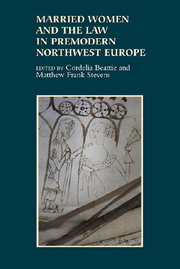Book contents
- Frontmatter
- Contents
- Figures and Tables
- Contributors
- Introduction: Uncovering Married Women
- 1 Inheritance, Property and Marriage in Medieval Norway
- 2 Spousal Disputes, the Marital Property System, and the Law in Later Medieval Sweden
- 3 When Two Worlds Collide: Marriage and the Law in Medieval Ireland
- 4 Married Women, Crime and the Courts in Late Medieval Wales
- 5 Peasant Women, Agency and Status in Mid-Thirteenth- to Late Fourteenth-Century England: Some Reconsiderations
- 6 London's Married Women, Debt Litigation and Coverture in the Court of Common Pleas
- 7 Married Women, Contracts and Coverture in Late Medieval England
- 8 Property, Family and Partnership: Married Women and Legal Capability in Late Medieval Ghent
- 9 ‘For His Interest’? Women, Debt and Coverture in Early Modern Scotland
- 10 The Worth of Married Women in the English Church Courts, c.1550–1730
- 11 Married Women, Work and the Law: Evidence from Early Modern Germany
- Index
4 - Married Women, Crime and the Courts in Late Medieval Wales
Published online by Cambridge University Press: 05 July 2013
- Frontmatter
- Contents
- Figures and Tables
- Contributors
- Introduction: Uncovering Married Women
- 1 Inheritance, Property and Marriage in Medieval Norway
- 2 Spousal Disputes, the Marital Property System, and the Law in Later Medieval Sweden
- 3 When Two Worlds Collide: Marriage and the Law in Medieval Ireland
- 4 Married Women, Crime and the Courts in Late Medieval Wales
- 5 Peasant Women, Agency and Status in Mid-Thirteenth- to Late Fourteenth-Century England: Some Reconsiderations
- 6 London's Married Women, Debt Litigation and Coverture in the Court of Common Pleas
- 7 Married Women, Contracts and Coverture in Late Medieval England
- 8 Property, Family and Partnership: Married Women and Legal Capability in Late Medieval Ghent
- 9 ‘For His Interest’? Women, Debt and Coverture in Early Modern Scotland
- 10 The Worth of Married Women in the English Church Courts, c.1550–1730
- 11 Married Women, Work and the Law: Evidence from Early Modern Germany
- Index
Summary
For the pre-conquest period of medieval Welsh history, historians interested in the activities of married women - their rights within marriage, their responsibilities within the household, or the work they performed - are severely limited by a lack of sources. Welsh chronicles have little to say about married women. Law texts provide theoretical information about married women, including information about marriage practices, the various fees that accompanied marriage negotiations, and the circumstances in which divorce was acceptable. However, the laws do not provide any specific examples of marriages being contracted or ended, fees that were exchanged between those contracting a marriage and the lord of a specific Welsh territory, or the extent to which a married woman's legal voice was muted by her husband. In short, Welsh chronicles and law texts leave much to be desired as sources for the historian attempting to reconstruct women's history in pre-conquest Welsh society.
After the English conquest of Wales in 1282-3, however, the historian suddenly finds him or herself with court roll evidence that sheds light on the issues of marriage, property ownership and work. Court rolls survive from various Welsh courts, both from the principality of Wales and from the Marcher lordships. The entries on these court rolls, although often brief in their wording, provide indicative information regarding the activities of women in Welsh communities, describing marital practices and domestic relations, as well as women's occupations.
- Type
- Chapter
- Information
- Married Women and the Law in Premodern Northwest Europe , pp. 71 - 90Publisher: Boydell & BrewerPrint publication year: 2013

